ARE YOUR PATIENTS SUFFERING FROM AN UNDERACTIVE THYROID?
Your patients deal with a lot of issues that may be directly related to their thyroid — immune resistance, energy levels, and metabolism are just some of them. And it could be due to one missing element in their diet or supplementation — iodine.
INFOMEDICA’S BOTTOM LINE:
If you have patients who feel tired all the time, have gained weight, can’t tolerate cold, have dry skin, or worry about breast, prostate, or thyroid cancer, there is a natural solution that can make a world of difference: iodine. The problem is, most people don’t get enough iodine from diet alone. But carefully guided supplementation can address a number of potential issues:
- Breast, prostate, ovarian, and thyroid cancer risk
- Weight and metabolism
- Migraine headaches
- Energy and libido
- “Brain fog” and focus
- Dry, brittle hair, and cracked skin
- Food cravings
Iodine is one of nature’s most amazing minerals. Unfortunately for our health, it is one that has been largely forgotten. But it wasn’t always that way.
Before the widespread use of synthetic drugs, iodine was recommended for everything: healing wounds and disease, destroying bacteria and viruses, and possibly even preventing cancer.
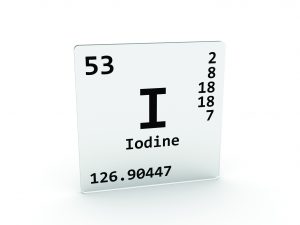
But new pharmaceuticals brushed iodine aside, and the result has been bad – high rates of cancer, thyroid dysfunction, and a build-up of toxins in our bodies – many of them from the foods we eat and water we drink.
Where Did Iodine Go?
Iodine as a medicine was once very common, but dietary iodine intake in many parts of the country was historically quite low. It wasn’t until after the First World War that medical professionals advocated for iodine enrichment in the diet.
Your patients may think that they get enough iodine from table salt, it’s easy to forget that iodine was added to salt to reduce incidence of goiter (enlarged thyroid gland) back in the 1920s. And that worked, for a while.
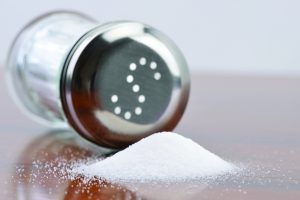
But in the 1940s, a single paper written by two researchers completely changed the way we use iodine. This poorly documented paper gave the impression that iodine use was not only archaic and unnecessary, but could even be dangerous, citing hyperthyroidism as a side effect. Almost overnight, the use of iodine in medicine was stopped and in its place we have a fear of one of the most important and critical nutrients in our diet. Iodine costs just pennies a day. With the advent of modern drugs in the 1940s and 1950s, could the profits realized by the drug companies have a bearing on discrediting the use of iodine for hypothyroidism?
Compounding the issue is the fact that people have cut back on table salt at home, and most food manufacturers don’t use iodized salt, and their products—especially frozen pizzas, appetizers, and processed meats – are laden with unhealthy types of sodium instead.

That’s because chlorine, fluoride, and bromide—which lower iodine levels in the body by blocking iodine receptors—are increasingly consumed from foods or through environmental exposure.
Chlorine is now used to purify water instead of iodine. Fluoride is almost universally found in toothpaste and drinking water. And bromide replaced iodine in commercial baked goods over 30 years ago. Unfortunately, these minerals aren’t just toxic for the thyroid—they’re dangerous in many ways. Fluoride is a problem because it blocks the ability of the thyroid gland to concentrate iodine and bromide can cause depression, headaches, and even hallucinations.
Additionally, consuming soy and gluten blocks thyroid function and inhibits the uptake of iodine. These ingredients are not only in obvious sources like soy milk and wheat breads, but also as hidden ingredients in many processed foods. They are another reason for iodine deficiency.
Iodine is Making a Comeback—And We Need It!
Fortunately, not everyone has forgotten what this amazing mineral can do. Integrative medical practitioners and other holistic-thinking individuals are bringing iodine back. And science is recognizing iodine’s great value, too. Researchers suggest that boosting iodine consumption could improve thyroid health, lower incidence of breast and prostate cancer and fibrocystic disease of the breast, and promote overall well-being.
However, some practitioners would argue that the minimum daily requirement for iodine is still set far too low—only 150 micrograms (mcg) per day. This is enough to prevent goiter, but not enough for truly beneficial health effects. And there’s nothing scary about getting more iodine in your system. After all, people in Japan consume more than 12 mg—12,000 mcg—of iodine per day. That’s 50 times more than the average American.
In fact, life expectancy in Japan is just over 83 years old, while in the United States it is about 78 years. The infant mortality in Japan is half that of the United States, too. And, America faces almost three times the number of deaths from breast cancer than Japan.

Studies have noted a connection between thyroid abnormalities and breast cancer, and iodine intake may be a factor. Today, one in eight American women will develop breast cancer during her lifetime. Compare that to thirty years ago, when iodine consumption was much higher, and one in 20 women developed breast cancer. Women in Japan who consume high amounts of dietary iodine have much lower rates of breast cancer and thyroid problems. However, when women emigrate from Japan to the United States and begin eating a Western diet, with its fractional amount of iodine, their breast cancer and thyroid disease rates increase dramatically.
Iodine Helps Stop Cancer
Iodine’s anticancer functions are one of its most important benefits. Scientific tests using estrogen-sensitive breast cancer cells exposed to iodine have shown that they are less likely to grow and spread. Fibrocystic breast disease, which creates swelling, tenderness, and discomfort, is also a common concern. In other clinical research, approximately 70 percent of patients experienced relief of pain and reduction in abnormal tissue with iodine supplementation. In patients with mastalgia—breast pain—at least 50 percent of the women had significant reductions in breast pain after taking 6 mg of iodine each day.
In another study, 98 percent of women receiving iodine treatment were pain-free by the study’s end, and 72 percent had improvements in breast tissue.
Why Iodine Can Help Prevent Breast and Prostate Cancer
Iodine works so well for breast health because it makes breast cells less sensitive to estrogen, and detoxifies toxic halogens—bromide, fluoride, and chloride. One study found that breast cancer patients had double the bromide levels compared to non-cancer patients.
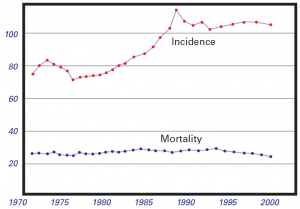
For the same reasons, iodine helps prevent the hormonal imbalances that leave some men more prone to prostate cancer. After all, women and men are equally subject to the estrogen-like chemicals so prevalent in modern packaging, home and office furnishings, and foods.
Different Forms of Iodine for Different Reasons
Supplemental iodine is available in different forms, each of which affects specific tissues in the body. Potassium and sodium iodide are best absorbed by the thyroid. Breast tissue uses iodine most efficiently in the form of molecular iodine.
Because of this, the best supplemental form should include more than one form of the mineral. The best formula provides three forms of iodine, sodium iodide, potassium iodide, and molecular iodine—at levels that can actually make a noticeably positive difference.
Dr. David Brownstein, M.D., is an author and iodine expert who has treated thousands of patients in his clinic. He states, “As I started to use larger amounts of iodine (12.5-50 mg/day) to achieve whole body sufficiency, I began to see positive results in my patients. Goiters and nodules of the thyroid shrank, cysts on the ovaries became smaller and began to disappear, patients reported increased energy, and metabolism was increased as evidenced by my patients having new success in losing weight. Libido improved in both men and women. People suffering from brain fog reported a clearing of the fogginess. Patients reported having vivid dreams and sleeping better. Most importantly, those with chronic illnesses that were having a difficult time improving began to notice many of their symptoms resolving.”
Iodine for Thyroid Support
Because the thyroid faces attacks all the time, it’s going to affect your patients’ moods, their immune defenses, their focus, and their weight.
Low-Functioning Thyroid
When the thyroid operates properly, one of it’s chief functions is the production of the hormone, thyroxine (T4), and the conversion of this hormone into triiodothyronine (T3) as needed for metabolism.
However, things can go bad if the body produces too little thyroxine to begin with. Normal metabolic and other chemical processes slow down, resulting in hypothyroidism.
Low functioning thyroids are common in both men and women, although women are far more apt to have hypothyroidism than men. But diagnosing hypothyroidism isn’t always what it should be. The most serious problem is that blood tests can be inaccurate and overlook a majority of low thyroid function diagnoses.
Why Most Thyroid Tests Don’t Provide the Full Picture
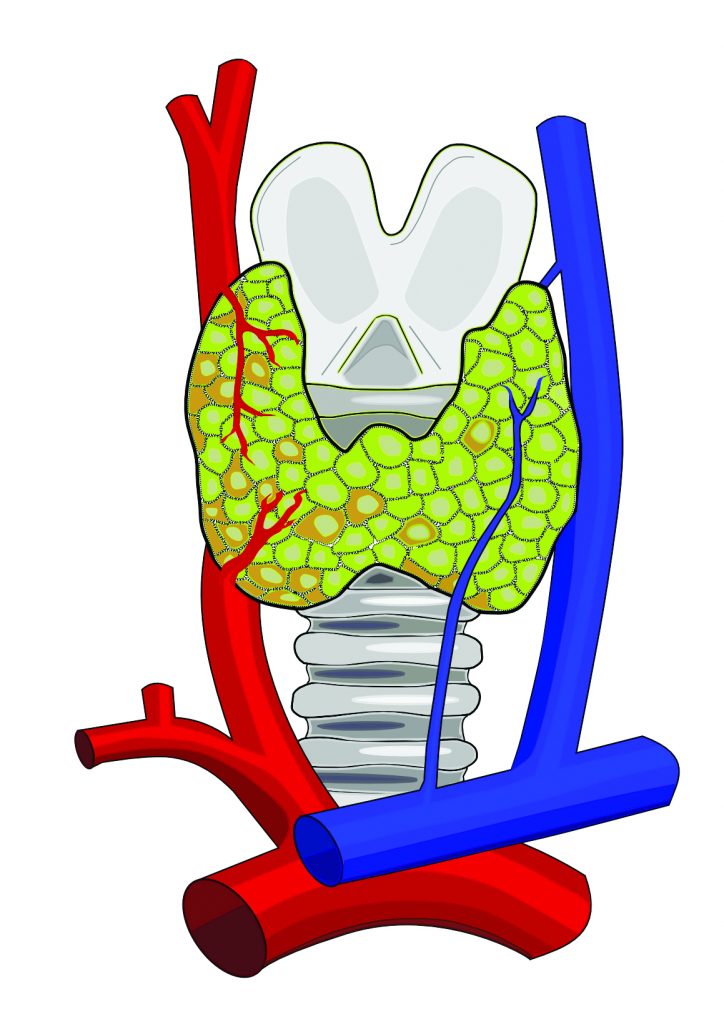
Blood levels of T4 will generally find adequate levels of the hormone, so it may seem natural to rule out hypothyroidism. But focusing on T4 levels only provides half of the picture, and the tests aren’t truly far-reaching. Many of these “good” readings of T4 don’t take into consideration the levels of T4 that need to be converted to T3, the active hormone.
In fact, readings of TSH (Thyroid Stimulating Hormone), thyroxine levels, and other blood parameters may appear to be in the “normal” range when the normal range may be far too broad. A test initiated by Dr. Broda Barnes, considered to be one of the premier experts on thyroid, is far better. Plus, it has the added convenience of being able to be performed by your patients at home.
You can instruct them that this procedure is simple:
- Take a non-digital thermometer and place it on your bedside table
- In the morning upon wakening – without getting out of bed – place the thermometer in your armpit and hold arm close to body for 10 minutes
- Read temperature and record (women in menstruation should wait for ovulation to cease)
- Repeat procedure each day for three days
Normal is between 97.8 and 98.2 degrees Fahrenheit.
Anything under 97.8 probably means varying degrees of hypothyroidism. The lower the temperature, the worse the condition. In some cases, it’s not unusual to find readings as low as 96 degrees.
L-Tyrosine—Required for the Thyroid
Your patients may not hear about L-tyrosine that much, but without it there would be no hormone function and the adrenals would also be severely affected. Along with iodine, it is one of the two major building blocks for making thyroid hormones.
Of course, L- tyrosine isn’t only involved with thyroid hormone production—it also helps produce noradrenaline and dopamine. But it is impossible to have a well-functioning thyroid without sufficient quantities in the diet or through supplementation. Due to L-tyrosine’s role in creating neurochemicals, it’s probably no surprise that this amino acid is an excellent stress reliever and a natural treatment for depression as well.
The Thyroid Affects Many Aspects of Health
The thyroid regulates the complete metabolic function of the body. Any dysfunction will make a tremendous impact on how much weight an individual will carry, and how easy (or not) it is to regulate that weight. Plus, an imbalance of its hormone can produce skin disorders, irregular heartbeat, congestive heart failure, high blood pressure, muscle dysfunction, gastrointestinal disturbances, mental confusion, severe depression, decreased libido, extreme fatigue, and apathy. The thyroid very definitely affects how your patients feel and how they relate to life in general.
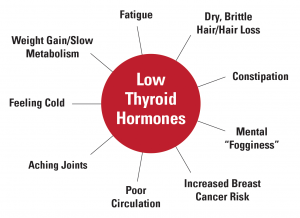
Supplementing With Iodine
It’s important to supplement iodine that includes different forms—including molecular iodine, sodium iodide, and potassium iodide—for more complete whole-body effects.
Your patients may wonder about iodine supplementation and have questions about dosage levels. You can remind them that iodine was routinely used by physicians until the late 1930’s at doses of 37 mg or more per day, depending upon the disorder. Aside from thyroid, recent research has proven that all cells have a receptor site for iodine, in particular the breast, prostate, ovaries, and uterus, which require iodine in order to function properly.
The right dosage truly depends on individual needs. Unfortunately, like many healthy nutrients, the reported amount for a suggested intake is only enough to prevent goiter. Some integrative practitioners often suggest 50 mg per day for 3 months followed by 6.25 or 12.5 mg daily thereafter for optimal health.
Do Your Patients Need Iodine?
The following is a list of symptoms that may be experienced by someone with low or deficient iodine levels. This is not a diagnostic test. It is meant as a nutritional guide to raise awareness of suboptimal iodine levels. It may also help patients determine whether they should seek further testing.
A Self Test of Symptoms for Iodine Deficiency:
Please read each descriptive symptom and check off any that describes how you feel.
Does your patient have iodine deficiency? This checklist may help you decide.
Symptoms:
- Sensitivity to cold. Their hands and feet are always cold.
- Their face is puffy and eyelids are swollen in the morning.
- They put weight on easily.
- They have dry skin.
- They have trouble getting up in the morning.
- They feel more tired at rest than when they are active.
- They are constipated.
- Their joints are stiff in the morning.
- They feel like they are living in slow motion.
- They have foggy brain.
- The outer 1/3 of their eyebrows is missing.
- Their lips are swollen and protruding, particularly the lower lip.
- They have ringing in the ears.
- Their hair is coarse and falls out, it is dry, brittle, and grows slowly.
- Their hair is dull and lusterless.
- They have frequency of urination.
- They have impaired hearing.
- They have reduced initiative.
- Their calves are big.
- Their legs and ankles are swollen in the morning.
- Their buttocks and thighs are too well padded, and they are pear shaped.
- They have high blood pressure and high cholesterol.
- Their heart is weak and they have a weak heartbeat.
- Their stomach sags and is pushed forward by the curvature of their spine.
- Their body temperature is below 97.8
Your patient said “Yes” to 12 or more symptoms: Your patient would almost certainly benefit from iodine supplementation.
Your patient said “Yes” to 5 – 12 symptoms: Your patient may want to consider testing and would be likely to benefit from iodine supplementation.
Your patient said “Yes” to 0 – 5 symptoms: Although your patient has few symptoms, you may want to consider recommending iodine at a lower dosage for ongoing good health, disease prevention and detoxification.


